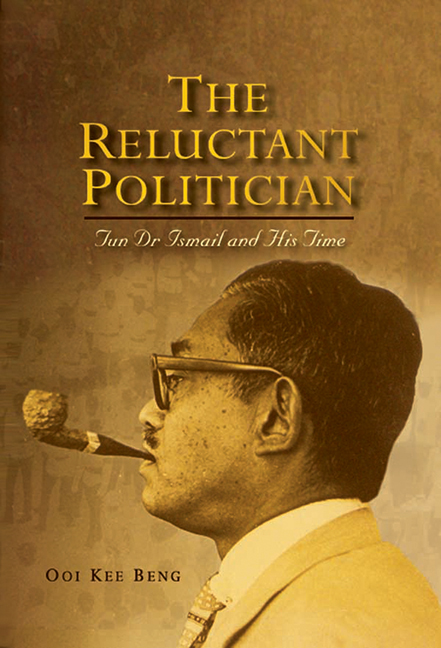Book contents
- Frontmatter
- Contents
- Foreword
- MESSAGE FROM THE DIRECTOR
- PREFACE
- Acknowledgements
- About the Author
- Chronology
- PART ONE Merdeka or Medicine?
- PART TWO Remaking Malaysia
- Chapter Six Forced from Retirement
- Chapter Seven A Lack of Time
- Chapter Eight Nailing Things into Place
- List of Abbreviations
- Bibliography
- Index
- Photographs
Chapter Six - Forced from Retirement
from PART TWO - Remaking Malaysia
Published online by Cambridge University Press: 21 October 2015
- Frontmatter
- Contents
- Foreword
- MESSAGE FROM THE DIRECTOR
- PREFACE
- Acknowledgements
- About the Author
- Chronology
- PART ONE Merdeka or Medicine?
- PART TWO Remaking Malaysia
- Chapter Six Forced from Retirement
- Chapter Seven A Lack of Time
- Chapter Eight Nailing Things into Place
- List of Abbreviations
- Bibliography
- Index
- Photographs
Summary
In mid-March 1969, Education Minister Khir Johari, who was director of election operations for the Alliance, presented the manifesto for the upcoming general elections to a committee of which Ismail was a member. The rather uncontroversial themes chosen were “higher standard of living for all” and “national unity” (MM 11 March 1969). Ismail subsequently campaigned in Johor for the 10 May general elections, calling for a strong and united government led by one party, and warning against the possibility of a coalition government, using Indonesia as a bad example to follow. When campaigning in aid of Chinese Alliance candidates running for the parliamentary seat of Muar Pantai and the state seat of Bandar Maharani, Ismail called for the Democratic Action Party (DAP) to be driven “back to Singapore so that it will not create confusion in the minds of Malaysians”, and said that the opposition party's slogan of “Malaysian Malaysia” was a Singaporean invention.
He did extremely well in his constituency of Johor Timor, winning 9,639 votes against his PMIP opponent's 2,419 (ST 12 May 1969). The Alliance Party, however, suffered a string of setbacks, and given the rising tension that followed wildly jubilant demonstrations in Kuala Lumpur organized by the opposition, a request was made by Razak to Ismail for the latter to return to his former post of Home Affairs Minister. Serious trouble was in the air. Ismail realized that the government faced a potential crisis, and was therefore willing to grant Razak his request on condition that the Tunku agreed to it.
He wrote a letter at 5p.m. — less than two hours before actual rioting broke out — to Eric Griffiths-Jones, the chairman of Guthrie Corporation, suggesting that the latter should not expect him to come to London the coming week. Ismail informed him that the Alliance's majority had been badly reduced: “Tun Razak had strongly pleaded that I join the government. I told him to ask the Tunku and if he wants me I have no alternative but to accept. Tunku very likely to ask me.” (Letters 13 May 1969).
Razak obviously trusted Ismail, and the latter's retirement at a relatively early age for health reasons was evidence that he did not harbour any high political ambitions of his own.
- Type
- Chapter
- Information
- The Reluctant PoliticianTun Dr Ismail and His Time, pp. 185 - 218Publisher: ISEAS–Yusof Ishak InstitutePrint publication year: 2007



